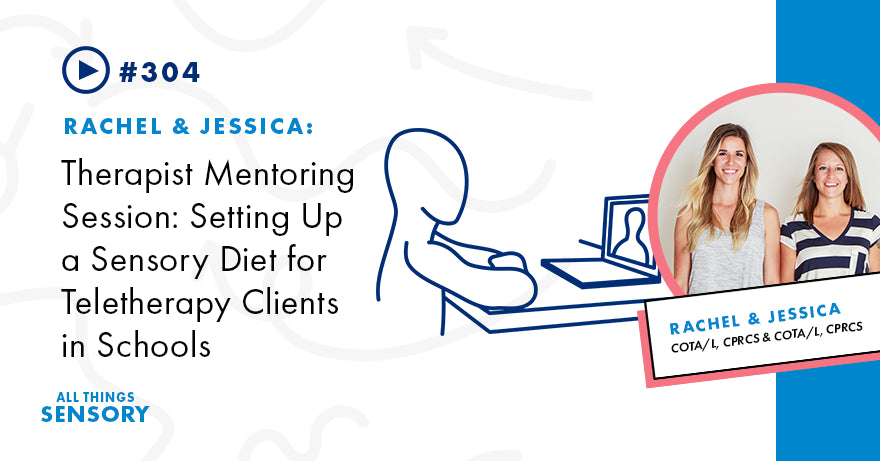Your Cart is Empty

We recently completed a 2-on-1 mentoring session with a fellow OT practitioner.
We discussed some simple activities to do with her young child as well as brainstormed ideas for her teletherapy clients!
Some of the topics include: seating accommodations, getting outside, teaching teens about technology, executive functioning, and more!
Make sure to check out all of our links below!
We’d love to answer your questions on the podcast! Fill out this form -> https://harkla.typeform.com/to/ItWxQNP3
All Things Sensory Podcast Instagram
Harkla Website - Shop Sensory Products!
What it Means to Meet the Sensory Threshold
Teletherapy for OTs and Parents
Sensational Brain Free Resources
During a mentoring session, another occupational therapist (OT) discussed her experience providing teletherapy to students in virtual schools. She sought advice on efficient strategies for delivering OT services remotely to enhance the students' learning environments.
Eligible students receive occupational therapy services as part of an Individualized Education Program (IEP) catering to kindergarten through 12th-grade students. This program aims to achieve various objectives, such as enhancing handwriting and typing skills, improving sensory and emotional regulation, and boosting executive functioning capabilities.
Evaluations are conducted online for convenience, helping students with minor issues. However, the assessment process is more complex for those facing significant challenges, requiring family involvement to build a strong support system.
About 75% of her sessions are 30 minutes long and require an internet connection, making it impractical to move children's computer use outdoors. However, adding more outdoor activities to their daily school routine could greatly enhance focus, attention, and self-control.
Children who are navigating the benefits and drawbacks of screen time might find these suggestions beneficial:
Collaborating on a sensory checklist
This tool identifies sensory preferences, explores differences, and facilitates discussions on liked and disliked sensations. It lays the groundwork for a personalized strategy to meet sensory needs daily.
Implement a sensory diet as a model for the student.
Capturing her sensory activity on video to show at the next meeting could be influential. Starting each session with a five-minute warm-up, such as yoga poses, inversions, or relaxation positions, and using visuals or screen sharing for demonstrations can significantly enhance the session's impact.
Discuss the child's feelings during each session
After warming up, check in with the individual to assess their well-being. This is also an excellent opportunity to utilize either the Zones of Regulation or the Alert program.
Help parents enhance the online learning environment
Coaching helps motivate families to get creative by transforming everyday household items—like using baking sheets as scooter boards and canned goods as makeshift weights or for stacking in exercises designed for heavy lifting.
Collaborate with your school's assistive technology team
Your school's assistive technology team offers a range of solutions for students under the Specially Designed Instruction (SDI) in their Individualized Education Program (IEP). These options can include alternative input devices, text-to-speech software, and specialized keyboards or interfaces for those in need.
It's essential to recognize that teenagers face many challenges, and developing their executive functioning skills is critical to their growth, particularly when they're home alone. They must show responsibility by logging into and attending their online classes, creating a college-like environment requiring active participation.
The challenge arises when students skip classes or ignore assignments, highlighting the importance of a reliable routine. Here are some strategy recommendations:
There are various strategies to ensure a successful online occupational therapy session despite the complexity of the process. Using floor space offers many activity options, like vertical spaces by attaching materials to walls.
Occupational therapists who utilize teletherapy with their students can significantly benefit from:
Occupational therapists can still offer valuable support and interventions to students in a virtual setting through careful planning and collaboration with parents and professionals. Additionally, keeping current with continuing education and networking with other virtual school-based therapists can enhance service quality.
By employing strategies that support sensory systems, executive functions, and interoception, virtual OT sessions can match the effectiveness of in-person ones in fostering students' growth and well-being. Through creativity, flexibility, and a growth mindset, occupational therapists can navigate the changing educational landscape and keep meeting their students' needs.
BORING, BUT NECESSARY LEGAL DISCLAIMERS
While we make every effort to share correct information, we are still learning. We will double check all of our facts but realize that medicine is a constantly changing science and art. One doctor / therapist may have a different way of doing things from another. We are simply presenting our views and opinions on how to address common sensory challenges, health related difficulties and what we have found to be beneficial that will be as evidenced based as possible. By listening to this podcast, you agree not to use this podcast as medical advice to treat any medical condition in either yourself or your children. Consult your child’s pediatrician/ therapist for any medical issues that he or she may be having. This entire disclaimer also applies to any guests or contributors to the podcast. Under no circumstances shall Rachel Harrington, Harkla, Jessica Hill, or any guests or contributors to the podcast, as well as any employees, associates, or affiliates of Harkla, be responsible for damages arising from use of the podcast.
Keep in mind that we may receive commissions when you click our links and make purchases. However, this does not impact our reviews and comparisons. We try our best to keep things fair and balanced, in order to help you make the best choice for you.
This podcast should not be used in any legal capacity whatsoever, including but not limited to establishing “standard of care” in a legal sense or as a basis for expert witness testimony. No guarantee is given regarding the accuracy of any statements or opinions made on the podcast.
Comments will be approved before showing up.